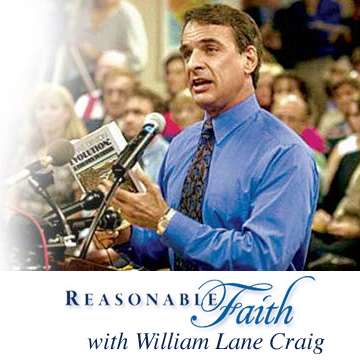
Why have public restrooms become an issue in our culture?
Kevin Harris: The issue of transgenderism isn’t going anywhere, in particular the debate over which bathroom you can use according to whether you feel like you’re a man or a woman. This has got conservatives extremely upset and more progressives, or liberal people, want to include this in their agenda.
You’ve been following this whole thing. What are your thoughts on the “bathroom wars”?
Dr. William Lane Craig: It’s an astonishing cultural shift. And it’s amazing how rapid it’s become such that now industry seems to be behind this. Professional sports seems to be supporting this. And if someone is of the opinion that biological men ought to use the men’s room and biological females ought to use the women’s room – he is regarded as a bigot. I find this absolutely astonishing. Especially since using a toilet facility is a matter of the privacy of other people who are in the room. It’s not a matter of the rights of the transgender person. The man who feels like he’s a woman trapped in a man’s body, when he goes into the ladies room, it’s the other women whose privacy it seems to me as being violated by having this man walk in… regardless of how he feels.
So, I find it so odd that the issue is about the person who wants to use the facilities opposite his biological sex, as opposed to the rights of the other people using those facilities, which seem to be violated – the rights to privacy.
Kevin: Well, because it’s going in that direction, we’re bypassing the main issue – that we, as Christians, could get on board. And that is: we ought to be loving toward people who may be confused about their gender, or who have what is known as gender dysphoria. We can get fully on board with reaching out to someone who has any kind of an identity problem or any kind of a bodily problem. But instead, they’ve turned this into this public restroom thing, demanding that, as a matter of principle, let them use that bathroom. And then, they have put it as part of the gay agenda. Advocate Magazine wants to include transgenderism and their whole agenda, but it has nothing to do with being homosexual or heterosexual.
Dr. Craig: Right. That would be a confusion. Someone who is experiencing gender dysphoria would be someone who feels that his biological sex doesn’t match up with the gender that he feels. So, I might feel like I am a woman trapped in a male body, and you can imagine how horrible that would be to have that kind of experience or to think that you’re a man trapped in a woman’s body. It must be just a terribly difficult experience for those who experience gender dysphoria. But, as you say, this is not anything to do with homosexual attraction or activity. It’s a matter of one’s self-perceived identity.
And then I’m just puzzled by thinking that folks who have gender dysphoria have rights to use public restroom facilities that trump the rights of privacy of women using those facilities or men using their facilities. By what principle or legality would that trump the rights of other people using those facilities? I don’t understand that.
Kevin: Because the gay agenda has to make a point.
Dr. Craig: That’s not an answer to the question, though.
Kevin: No. No, it’s not. Christianity Today has the leading Christian And scholar and gender dysphoria, Mark Yarhouse, who defines gender identities or gender dysphoria as this: It refers to deep and abiding discomfort over the incongruence between one’s biological sex and one’s psychological and emotional experience of gender.
Dr. Craig: Right. Now, what’s odd – I think – is that Yardhouse defines gender identity as simply how people experience themselves as male or female, depending on how masculine or feminine they feel. Notice the emphasis on feelings. And that’s odd. Why would one’s identity be a matter of feelings? I think that that’s a misuse of terms, philosophically. Identity is mind independent. It’s something that is objective, regardless of how you feel. So, the term gender identity seems to me to be something of an oxymoron. It’s not really about one’s identity. It’s rather a matter of one’s self-perception or one’s feelings about oneself.
Kevin: For example, if I were to walk up to you and say, “I am 6’ 5” Chinese woman.” And I’m actually a 5’11” Caucasian man.
You’d reply, “No. You’re 5’11. You’re a Caucasian man. You’re not a Chinese woman.”
“But, I feel like I’m a Chinese woman. I am a six-foot-five Chinese woman trapped in a five-foot-eleven Caucasian man’s body. That’s how I feel. That’s my identity. That’s how I choose to identify.
Dr. Craig: This is a non-philosophical use of the word identity. We’re talking about a purely subjective self-perception. But, in terms of objective identity, for example, to be absurd: a horse is not identical to a human being. And if a human being felt that he were a horse, that would just be irrelevant to his identity as a human being – no matter how he felt. So, it’s important when people talk about these things that we do understand that we’re using terms, in a sense, that is completely subjective and a matter of self-perception. We’re not talking about objective identity.
Kevin: He distinguishes further on the second page: “…transgender is an umbrella term for the many ways people experience a mismatch between their gender identity and their biological sex.” So, there’s gender dysphoria – also an umbrella term – and Transgender. This means that transgender people are much more common than those formally diagnosed with gender dysphoria.
Dr. Craig: Right. The people with gender dysphoria are really conflicted. They point out that the manual for the American Psychiatric Association used to define this as Gender Identity Disorder. This was a mental health problem. A man who thinks he’s a woman has a mental health problem. And they’ve now changed this in the APA’s diagnostic manual to speaking of Gender Dysphoria rather than Gender Identity Disorder. It’s become politically incorrect now to think of this as a mental health disorder, even though these people have severe dysfunction as result of how they feel. But there can be transgender experiences, he says, that are not gender dysphoria. There could be a whole continuum, were some people could just feel like they could go either way. It’s a continuum between being a man and being a woman; and it is not so severe as those who suffer this dysphoria.
Kevin: Bill, am I overstating the case when I say this is very scary and problematic – in that a rapist or a voyeur could put on a wig and woman’s clothing and go into a woman’s bathroom and then cry dysphoria / gender dysphoria, or cry transgender when apprehended?
Dr. Craig: Well, it’s already happened in Dallas. They caught a guy in the girls bathroom with a wig; and he was just trying to spy on the girls. But he said, “No. I’m transgender.”
To think that this could compromise, not just the privacy but even the safety of little girls using the ladies room and having men come in there. Suppose there’s nobody else in there except the little girl, and then this person claiming to be transgender. I just don’t understand how people can think that the rights of people suffering from transgender dysphoria trumps the rights of other persons to privacy and safety.
Kevin: Well, it’s crazy thinking, it seems to be, in order to push an agenda and people seem to be blinded by their agenda if they can’t see the problems with this. Or, what would you do, if you were king of the world?
Dr. Craig: I would I would base it on one’s biological sex and that’s determined by one’s DNA. There’s actually a “Question of the Week”, early on in our Reasonable Faith website, written by one of my students, on hermaphrodites and what they should do about dating. And these are persons who don’t simply experience that they are of the opposite sex; but actually have a mixture – biologically – of sexual traits, so that they’re really in a bad way. Because their very body is not clearly female or male. But, their DNA is clearly male or female. That is their biological sex. And so, it seems to me that gender identity ought to be determined by your genetic identity. That is what identity is. It’s an objective fact, not a subjective perception. And so, I would say that people who are biologically male ought to use the men’s room. And people who are biologically female ought to use the ladies room. And even though that may cause them discomfort, nevertheless, this is for the rights and out of deference to other persons who are using those facilities and have the right to privacy and safety. Now, in many cases, there can be unisex bathrooms where you lock the door when you go in. And there’s just facilities that can be used by either sex – family bathrooms, or things of that sort. That would be unproblematic, as it seems to me.
Kevin: Can you imagine costs to a business if they start having to have men’s and women’s and then either/or options?
Dr. Craig: It would be incredible. And there simply is no reason to force commercial enterprises, or others, to have those kind of facilities out of deference to a segment of the population that is so tiny as to be almost minuscule. It points out in the article, that the number of people that are transsexual is as low as 0.005 to 0.014, with respect to men. It’s this is a tiny segment of our society, and so I think it’s an unreasonable burden to require commercial enterprises to have a men’s room, a ladies room and then a transgender facility. And actually, you’d need four: one for those who think that their women, and then you’d need one for those who think that they’re men.
Kevin: why stop there? And then you’d have to do another bathroom for someone who’s perhaps had a sex change operation… and eventually you’d have to have 50 bathrooms to accommodate everybody’s agenda.
Dr. Craig, I think you’ve given us some good direction on this. It may not even be necessary to go to the philosophical question of essence versus what you think you are – if you’re born a male, is there an essence present there that needs to be appealed to that you are, in fact, male whether you feel like you are not.
Dr. Craig: Right. And I would say that that would be genetically evident. Even if there is a soul that is gendered – feminine souls and masculine souls, for example – that’s possible. But in any case, the body will bear the evidence in its genetic makeup of whether this person’s biologically male or female.
(This podcast is by Reasonable Faith / William Lane Craig. Discovered by e2 media network and our community — copyright is owned by the publisher, not e2 media network, and audio is streamed directly from their servers.)












